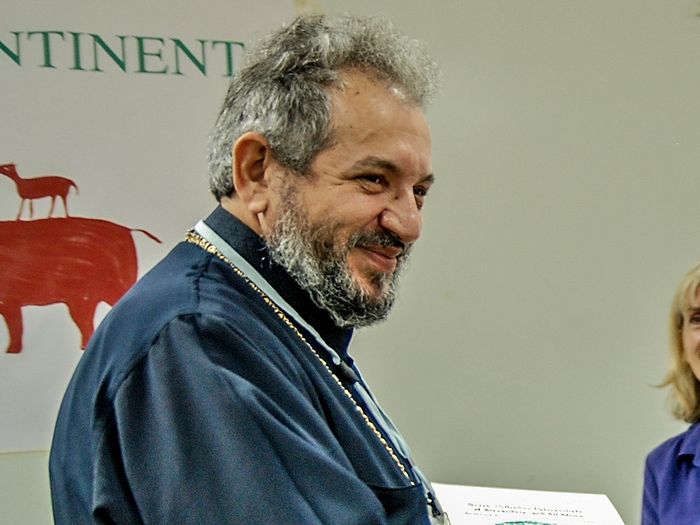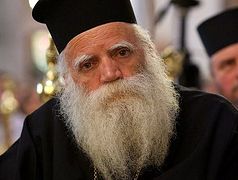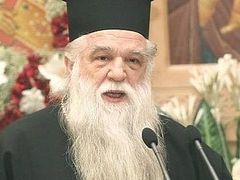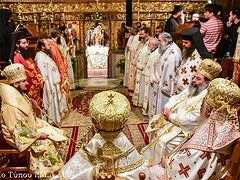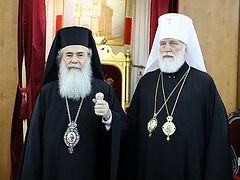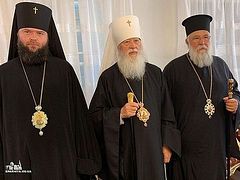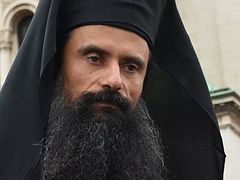Zimbabwe, October 4, 2019
Another hierarch has joined the chorus of those calling for dialogue and a pan-Orthodox solution to the ongoing Ukrainian ecclesiastical crisis.
In a statement published on Romfea, His Eminence Metropolitan Seraphim of Zimbabwe of the Patriarchate of Alexandria warns of what could happen if the Local Orthodox Churches do not come together in dialogue to solve the issue, which, in fact, threatens “the greatest schism that the Orthodox Church will know in the course of her history.”
A full English translation of his statement is available on Orthodox Synaxis.
His Eminence begins by noting that the details of how to grant autocephaly to a new Local Church were hammered out and accepted at a number of pan-Orthodox conferences since 1960. If these decisions are not respected, he writes, “things will develop very badly for the preservation of the visible unity of the Local Orthodox Churches.”
While this procedure was originally meant to be ratified at the Council of Crete in 2016, it was dropped from the agenda months beforehand. In November of last year, Patriarch Bartholomew openly told the Romanian Holy Synod that because autocephaly was not discussed at Crete, he was free to ignore the procedure that had been worked out in pan-Orthodox consensus.
“We must not allow political factors to affect the strengthening of the visible unity of the Local Orthodox Churches,” Met. Seraphim continues, echoing the concerns raised by a number of hierarchs, including His Beatitude Metropolitan Rostislav of the Czech Lands and Slovakia.
Recall that Makary Maletich, the head of the “Ukrainian Autocephalous Orthodox Church,” which joined the “Orthodox Church of Ukraine” created by ex-President Petro Poroshenko and Pat. Bartholomew, acknowledged that Pat. Bartholomew decided to go ahead with the project because he knew he had the support of the United States and other great Western powers.
Met. Seraphim, who is named in honor of the great Russian saint Seraphim of Sarov, then refers to the fears of some that the Russian Church will use the opportunity presented by the Ukrainian problem to install its own bishops all around the world, without any regard for the Patriarchate of Constantinople.
“In the absence of dialogue with the Sister Orthodox Churches to discuss the issue of canonical ecclesiastical jurisdiction in Ukraine, the result is that today the Russians will send their clergy into all areas of the canonical ecclesiastical jurisdiction of our Ecumenical Patriarchate, even within Turkey and, indeed, Constantinople,” he writes.
In December, the Russian Holy Synod created an Exarchate for Southeast Asia, for which four dioceses were created in February, which angered the Patriarchate of Constantinople, which already had metropolises in Korea and Singapore. Since the Russian Synod interrupted communion with Constantinople last year, Russian clergy have celebrated Liturgies in Turkey several times, some on Russian territory at the General Consulate in Istanbul and some in various churches throughout Turkey.
Further, Met. Seraphim fears that the Russian Church will do the same to any Local Church that eventually recognizes the church created by the Patriarchate of Constantinople in Ukraine, which will severely harm the Orthodox Church in these troubled times, when it should be strong and united.
Therefore, Met. Seraphim believes, a joint committee involving both Moscow and Constantinople must immediately began examining the issue and preparing for a meeting of the primates of the two Churches.
Recall that Patriarch Kirill met with Pat. Bartholomew in August of last year and proposed a meeting of scholars and hierarchs to discuss the history around the transfer of the Kiev Metropolia to the Russian Church, but Pat. Bartholomew refused.
Met. Seraphim also notes that His Beatitude Archbishop Chrysostomos of Cyprus took the initiative to meet with several primates “in order that we may prioritize the dialogue of Love so that we may prevent the worst.”
“Without dialogue, the problems will not be solved and, on the contrary, they will grow and suffocate us,” Met. Seraphim is certain.
Abp. Chrysostomos recently revealed that he stopped meeting with his brother primates because it angered Pat. Bartholomew.
The Alexandrian hierarch also laments that “some fanatics” are currently cultivating “hatred and evil” without regard to how it affects the Church. We must not let such people and tactics sidetrack us, and we must pray for God’s enlightenment, he states.
He then writes of when Patriarch Bartholomew recently spoke to the United Nations and the World Council of Churches about climate change. On the one hand, the Patriarch called for dialogue and cooperation on environmental matters, while on the other, the Patriarchate insists in the face of repeated calls for dialogue from the Orthodox Churches around the world that the stage for dialogue about Ukraine is already past. Because of this contradiction in approach, there were those at the UN and WCC who could not take Pat. Bartholomew seriously, Met. Seraphim writes.
Metropolitan Emmanuel of Gaul of the Patriarchate of Constantinople has claimed that when Constantinople sent delegations to the other Local Churches last summer to inform them that the Patriarchate had already resolved to grant autocephaly in Ukraine, this somehow constituted a part of a “synodal” process.
Wisdom and prudence are needed to preserve the ecumenicity of the Patriarchate of Constantinople, which the Zimbabwe hierarch believes has been strengthened over the past 60 years, including with 2016’s Crete Council.
However, “I do not think that we can protect the ecumenical institution of our Ecumenical Patriarchate with decisions that are contrary to the canons of the Orthodox Church,” he reflects.
“All we will do is run the risk of making our Ecumenical Patriarch into a pastor of an isolated parish.”
Met. Seraphim concludes with another call for pan-Orthodox dialogue for the preservation of Orthodox unity, emphasizing the role of Constantinople: “We must, through dialogue, find a solution where our Ecumenical Patriarch always as Protos, with his coordinating role of love and unity, will lead all the Local Orthodox Churches and even the Russians to be the visible symbol of our unity and not the threat of the greatest schism that the Orthodox Church will know in the course of her history.”
Met. Seraphim previously addressed the Ukraine issue, similarly calling for pan-Orthodox dialogue.
“When individuals who, consciously or unconsciously believe that they are the continuation of the Roman Emperor, the Byzantine Emperor, or the Russian Tsar affect the life of the Church, then problems are created in the humble ministry of the Church and so secular elements of secular power enter inside and rifts that threaten visible unity are created,” he wrote in his previous article.

